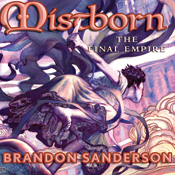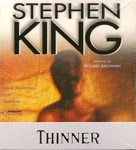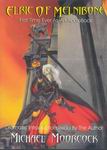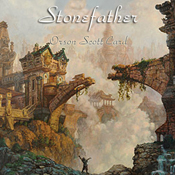
Greetings fellow sci-fi and fantasy audiobook junkies. My name is Mark Flavin (from California not Ireland) and I am one of many reviewers to answer the call made by Jesse. I enjoy sci-fi and fantasy in all forms but have a special love for cyberpunk, space opera, science fantasy and epic fantasy. I am thrilled to be able to share my reviews with you and I hope that I can add something of value to this awesome blog.
 The Final Empire: Mistborn Book 1
The Final Empire: Mistborn Book 1
By Brandon Sanderson; Read by Michael Kramer
Audible Download – 24 Hours 40 Mins [UNABRIDGED]
Publisher: Audible / Macmillan Audio
Published: July 2007
Themes: / Fantasy / Epic Fantasy / Sword and Sorcery / Military / Political / Magic
For a thousand years the ash fell and no flowers bloomed. For a thousand years the Skaa slaved in misery and lived in fear. For a thousand years the Lord Ruler, the “Sliver of Infinity,” reigned with absolute power and ultimate terror, divinely invincible. Then, when hope was so long lost that not even its memory remained, a terribly scarred, heart-broken half-Skaa rediscovered it in the depths of the Lord Ruler’s most hellish prison. Kelsier “snapped” and found in himself the powers of a Mistborn. A brilliant thief and natural leader, he turned his talents to the ultimate caper, with the Lord Ruler himself as the mark.
When I first stumbled across this book on audible I was sceptical. I have to admit this was almost a book I judged by its cover and even after reading the book I am unsure what is going on in this cover. Fortunately I had just finished listening to Elantris and really wanted to see what Brandon Sanderson had in store for me in his next book. I am really glad I looked past the cover because Mistborn is an incredible story of epic fantasy set in a world which is alien and yet the implication (unstated) is it could be our future or past.
The characters in the story have real depth and by the end of the first book I felt like I was a member of the gang, a silent partner in their quest to overthrow the tyrannical rule of the lord ruler and restore freedom to the people. However, where the real depth of the story comes is the system of “magic” (referred to in the story as allomancy) that Brandon Sanderson created. Rather than chanting spells, or tapping into divine powers the characters in the story have the ability to burn metals and each metal has a direct counterbalance. This creates situations where powers are negated and I found that I became actively engaged in the story as I tried to figure out how one character would use their metal to negate the other character’s effects.
In addition to the fantastic plot-line and deep characterizations of the main players Brandon Sanderson does an excellent job of creating a framework for the world of the final empire. From describing the falling ash storms to the rising mists each evening the world is so vividly described that I at times forgot what I was doing. Beyond the descriptive environment there are creatures which are described terrible in form. An example of vivid imagery is in his description of the Steel Inquisitor I won’t ruin it for you but the first time this “thing” was introduced I felt chills. Not so much out of fear (though it was terrible to imagine) but out of excitement that this was something truly unique and new.
Complimenting the excellent storyline is the reading by Michael Kramer who does a fantastic job of giving voice to the characters and describing the land in beautiful detail. The vocal range and emotional range of his reading was excellent. Michael Kramer does an excellent job of switching between characters and into a neutral narrator tone when appropriate. By far my favorite voice in the book is that of Breeze and in the following novels he becomes one of my characters simply because Michael Kramer’s vocalization is so spot on that the character literally seems to come alive.
If I do have one complaint about this book (other than the cover) it is that more attention could have been paid to the audio production. While I don’t expect Dolby 5.1 digital surround sound from an audible download it would be nice to have the audio levels consistent instead of having the audio suddenly get louder and just as suddenly go low. Also there were a couple of times when words were repeated like the narrator was saying them expecting it to be edited out. All-in-all these were minor issues and did not take away from the overall enjoyment of the book.
Plot twists, action and a fascinating system of “magic” make this a great read and Michael Kramer’s excellent narration makes this a fantastic listen. This is definitely a vacation/beach book because if your like me once you get started you will not want to put it down.
Posted by Mark Flavin






